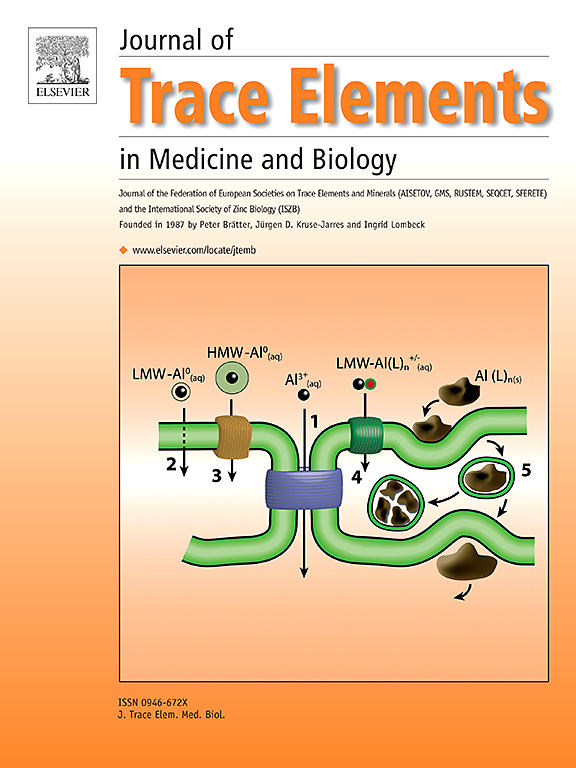热应激需要高锌饮食来对抗氧化应激,并改善细胞因子和免疫反应
IF 3.6
3区 医学
Q2 BIOCHEMISTRY & MOLECULAR BIOLOGY
Journal of Trace Elements in Medicine and Biology
Pub Date : 2025-04-25
DOI:10.1016/j.jtemb.2025.127662
引用次数: 0
摘要
热应激(HS)对牲畜生产、免疫反应和抗氧化状态产生不利影响。锌(Zn)是金属酶的重要组成部分,在维持这些功能中起着至关重要的作用,在高温下锌的需求量可能会增加。本研究测定了HS下大鼠的日粮锌需取量。72只断奶Wistar大鼠按3 × 2因子设计分为6组(3种Zn水平:14.6 ppm (CON), 32.7 ppm (Zn1)和48.9 ppm (Zn2);2 .环境条件:热中性(TN)和HS。各组饲喂相同的基础纯化饲粮,饲粮中锌以硫酸锌(ZnSO4.7H2O)的形式提供。试验开始28 d,各组均在TN条件下饲养,随后3组分别在不同饲粮锌水平下,在干湿室中暴露于HS(5 hr/d) 14 d。对血液、血清和器官样本进行生化、激素、免疫和矿物质分析。HS升高应激标志物(皮质醇、丙二醛、细胞因子、接触珠蛋白、丙氨酸转氨酶和天冬氨酸转氨酶),而较高的膳食锌(48.9 ppm)显著降低了HS下这些标志物。抗氧化酶(超氧化物歧化酶和过氧化氢酶)和体液免疫反应在对照组较低,但在两种环境下均随饲料锌的增加而改善。与TN组相比,随着饲粮锌水平的提高,HS组血清中Zn、Cu、Mn和Fe的矿物矿浓度升高。综上所述,在纯化饲粮中添加48.9 ppm的高锌可以通过降低应激标志物、增强抗氧化酶和体液免疫反应来有效缓解HS。本文章由计算机程序翻译,如有差异,请以英文原文为准。
Heat stress demands high dietary zinc to combat oxidative stress, and improve cytokine and immune response in rats
Heat stress (HS) adversely impacts livestock production, immune response, and antioxidant status. Zinc (Zn), a key component of metalloenzymes, plays a vital role in maintaining these functions, with increased Zn requirements likely under HS. This study determined the dietary Zn requirement of rats under HS. Seventy-two weaned Wistar rats were allocated into six groups in a 3 × 2 factorial design (3 Zn levels: 14.6 ppm (CON), 32.7 ppm (Zn1), and 48.9 ppm (Zn2); 2 environmental conditions: thermoneutral (TN) and HS. All groups received the same basal purified diet with varying dietary Zn supplied as zinc sulphate (ZnSO4.7H2O). Initially for 28 days all groups were maintained under TN condition, later three groups from each dietary Zn levels were exposed to HS (5 hr/d) for 14 days in a psychrometric chamber. Blood, serum, and organ samples were analyzed for biochemical, hormonal, immune, and mineral profiles. HS elevated stress markers (cortisol, malondialdehyde, cytokines, haptoglobin, alanine transaminase, and aspartate transaminase), while higher dietary Zn (48.9 ppm) significantly reduced these markers under HS. Antioxidant enzymes (superoxide dismutase and catalase) and humoral immune response were lower in control groups but improved with increased dietary Zn in both environments. The mineral concentrations of Zn, Cu, Mn, and Fe in serum were increased with higher dietary Zn levels in HS compared to TN groups. In conclusion, higher dietary Zn level at 48.9 ppm in a purified diet is effective in alleviating HS by lowering stress markers and bolstering antioxidant enzymes and humoral immune responses.
求助全文
通过发布文献求助,成功后即可免费获取论文全文。
去求助
来源期刊
CiteScore
6.60
自引率
2.90%
发文量
202
审稿时长
85 days
期刊介绍:
The journal provides the reader with a thorough description of theoretical and applied aspects of trace elements in medicine and biology and is devoted to the advancement of scientific knowledge about trace elements and trace element species. Trace elements play essential roles in the maintenance of physiological processes. During the last decades there has been a great deal of scientific investigation about the function and binding of trace elements. The Journal of Trace Elements in Medicine and Biology focuses on the description and dissemination of scientific results concerning the role of trace elements with respect to their mode of action in health and disease and nutritional importance. Progress in the knowledge of the biological role of trace elements depends, however, on advances in trace elements chemistry. Thus the Journal of Trace Elements in Medicine and Biology will include only those papers that base their results on proven analytical methods.
Also, we only publish those articles in which the quality assurance regarding the execution of experiments and achievement of results is guaranteed.

 求助内容:
求助内容: 应助结果提醒方式:
应助结果提醒方式:


